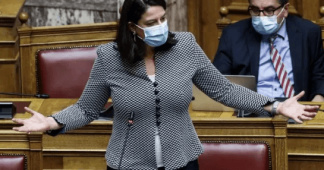UK Universities Place “Trigger Warnings” on Greek Tragedies and Literature
Alexander Gale
Universities in the United Kingdom have reportedly placed “trigger warnings” on ancient Greek tragedies, as well as Shakespeare, Beowulf, and others.
British university staff has attached trigger warnings to warn students about upsetting materials which may appear in classical works of literature.
The Telegraph, a British tabloid, obtained a text of a warning that was provided by professors for their students, which warned them that the materials might be “triggering”.
Universities providing “trigger warnings”
According to The Telegraph, Greek tragedies are among the materials that staff worry might trigger certain students. In particular, staff at the University of Derby warned that plays like Sophocles’ Oedipus Rex “explicitly engage with themes of violence and trauma, frequently sexual in nature.”
Staff at the University of Derby said that the warning was necessary for ancient Greek tragedies and that the “module leader believes that students benefit from being made aware of this before classes begin.”
Greek tragedies are not the only materials college staff fear might offend or distress students. The newspaper also reported that the University of Aberdeen in Scotland singled out Beowoulf for its depictions of “animal cruelty” and “ableism.” The epic poem, written in Old English, is one of the most important works in the English literary canon.
Meanwhile, the University of Warwick, a prestigious Russell Group institution, warned students that Thomas Hardy’s Far From the Madding Crown portrays the “cruelty of nature” and of “rural life.”
For staff at the University of Greenwich, Rime of the Ancient Mariner was another problematic story. University staff feared that the “potentially upsetting” death of an albatross could be too much for students to handle.
The role of catharsis in Greek tragedy
The ancient Greek philosopher Aristotle discussed the purpose of tragic theatre in Poetics. Tragedy enables the spectator to experience catharsis, which is essentially a drawing out of intense emotions, such as pity and fear.
Some university professors are concerned that trigger warnings detract from the experience of studying tragic theatre and literature. Professor Frank Furedi from the University of Kent told The Telegraph, “A trigger warning is merely a banal way of saying beware of engaging with this wonderful art form. The real tragedy is the use of trigger warnings for grown-up students who are about to encounter their first taste of Euripides.”
“In order to draw a reader or an audience into the drama, tragedy is meant to provoke emotional upheaval and cause upset. If they fail to provoke strong emotions then a tragedy is anything but tragic. There is no such thing as a safe tragedy and students who wish to study this literary form have to live with it,” he also said.
We remind our readers that publication of articles on our site does not mean that we agree with what is written. Our policy is to publish anything which we consider of interest, so as to assist our readers in forming their opinions. Sometimes we even publish articles with which we totally disagree, since we believe it is important for our readers to be informed on as wide a spectrum of views as possible.











